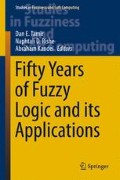Abstract
Additive fuzzy systems generalize the popular mixture-density models of machine learning. Additive fuzzy systems map inputs to outputs by summing fired then-parts sets and then taking the centroid of the sum. This additive structure produces a simple convex structure: Outputs are convex combinations of the centroids of the fired then-part sets. Additive systems are uniform function approximators and admit simple learning laws that grow and tune rules from sample data. They also behave as conditional expectations with conditional variances and other higher moment that describe their uncertainty. But they suffer from exponential rule explosion in high dimensions. Extending finite-rule additive systems to fuzzy systems with continuum-many rules overcomes the problem of rule explosion if a higher-level mixture structure acts as a system of tunable meta-rules. Monte Carlo sampling can then compute fuzzy-system outputs.
Access this chapter
Tax calculation will be finalised at checkout
Purchases are for personal use only
References
Kosko, B.: Neural Networks and Fuzzy Systems, Prentice-Hall (1991)
Kosko, B.: Fuzzy systems as universal approximators. IEEE Trans. Comput. 43(11), 1329–1333 (1994)
Kosko, B.: Optimal fuzzy rules cover extrema. Int. J. Intell. Syst. 10, 249–255 (1995)
Dickerson, J.A., Kosko, B.: “Fuzzy Function Approximation with Ellipsoidal Rules”, with J.A. Dickerson. IEEE Trans. Syst. Man Cybern. 26(4), 542–560 (1996)
Kosko, B., Fuzzy Engineering. Prentice-Hall (1996)
Kosko, B.: Global stability of generalized additive fuzzy systems. IEEE Trans. Syst. Man Cybern. 28(3), 441–452 (1998)
Mitaim, S., Kosko, B.: Neural fuzzy agents for profile learning and adaptive object matching. Presence 7(6), 617–637 (1998)
Mitaim, S., Kosko, B.: The shape of fuzzy sets in adaptive function approximation. IEEE Trans. Fuzzy Syst. 9(4), 637–656 (2001)
Lee, I., Anderson, W.F., Kosko, B.: Modeling of gunshot bruises in soft body armor with an adaptive fuzzy system. IEEE Trans. Syst. Man Cybern. 35(6), 1374–1390 (2005)
Kandel, A.: Fuzzy Mathematical Techniques with Applications. Addison-Wesley (1986)
Klir, G.J., Folger, T.A.: Fuzzy Sets, Uncertainty, and Information. Prentice-Hall (1988)
Terano, T., Asai, A., Sugeno, M.: Fuzzy Systems Theory and its Applications. Academic Press (1992)
Zimmerman, H.J.: Fuzzy Set Theory and its Application. Kluwer (1985)
Isaka, S., Kosko, B.: Fuzzy Logic. Sci. Am. 269, 76–81 (1993)
Jang, J.-S.R., Sun, C.-T.: Functional equivalence between radial basis function networks and fuzzy inference systems. IEEE Trans. Neural Netw. 4(1), 156–159 (1993)
Moody, J., Darken, C.: Fast learning in networks of locally tuned processing units. Neural Comput. 1, 281–294 (1989)
Specht, D.F.: A general regression neural network. IEEE Trans. Neural Netw. 4, 549–557 (1991)
Wang, L.-X., Mendel, J.M.: Fuzzy basis functions, universal approximation, and orthogonal least-squares learning. IEEE Trans. Neural Netw. 3, 802–814 (1992)
Watkins, F.A.: Fuzzy Engineering. Ph.D. Dissertation, Department of Electrical Engineering, UC Irvine, Irvine, CA (1994)
Watkins, F.A.: The representation problem for additive fuzzy systems. In: Proceedings of the IEEE Int. Conference on Fuzzy Systems (IEEE FUZZ), vol. 1, pp. 117–122, March 1995
Osoba, O., Mitaim, S., Kosko, B.: Bayesian inference with adaptive fuzzy priors and likelihoods. IEEE Trans. Syst. Man Cybern.-B 41(5), 1183–1197 (2011)
Osoba, O., Mitaim, S., Kosko, B.: Triply fuzzy function approximation for hierarchical bayesian inference. Fuzzy Optim. Decis. Making 11(3), 241–268 (2012)
Hogg, R.V., McKean, J.W., Craig, A.T.: Introduction to Mathematical Statistics, 7th edn. Prentice Hall, New York (2013)
Osoba, O., Mitaim, S., Kosko, B.: The noisy expectation-maximization algorithm. Fluctuation Noise Lett. 12(3), 1350012-1–1350012-30 (2013)
Audhkhasi, K., Osoba, O., Kosko, B.: Noise benefits in backpropagation and deep bidirectional pre-training. In: Proceedings of the 2013 International Joint Conference on Neural Networks, pp. 2254–2261, August (2013)
Audhkhasi, K., Osoba, O., Kosko, B.: Noise benefits in convolutional neural networks. In: Proceedings of the 2014 International Conference on Advances in Big Data Analytics, pp. 73–80, July (2014)
Kong, S.G., Kosko, B.: “Adaptive fuzzy systems for backing up a truck-and- trailer”, with S.G. Kong. IEEE Trans. Neural Netw. 3(2), 211–223 (1992)
Cappe, O., Douc, R., Guillin, A., Marin, J.-M., Robert, C.P.: Adaptive importance sampling in general mixture classes. Stat Comput., 18(4), 447–459 (2008)
Author information
Authors and Affiliations
Corresponding author
Editor information
Editors and Affiliations
Rights and permissions
Copyright information
© 2015 Springer International Publishing Switzerland
About this chapter
Cite this chapter
Kosko, B. (2015). Additive Fuzzy Systems as Generalized Probability Mixture Models. In: Tamir, D., Rishe, N., Kandel, A. (eds) Fifty Years of Fuzzy Logic and its Applications. Studies in Fuzziness and Soft Computing, vol 326. Springer, Cham. https://doi.org/10.1007/978-3-319-19683-1_14
Download citation
DOI: https://doi.org/10.1007/978-3-319-19683-1_14
Published:
Publisher Name: Springer, Cham
Print ISBN: 978-3-319-19682-4
Online ISBN: 978-3-319-19683-1
eBook Packages: EngineeringEngineering (R0)

